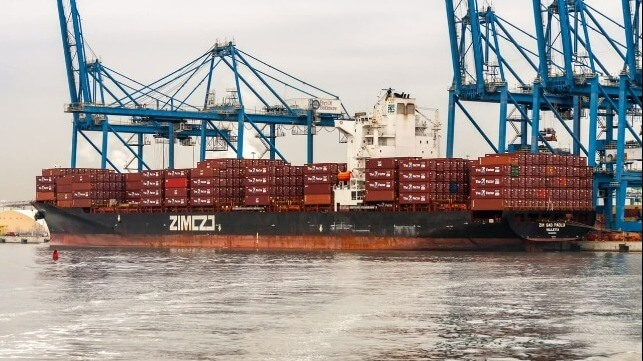Port of Baltimore Welcomes New Container Shipping Line Service

[By: Port of Baltimore]
The Maryland Department of Transportation Maryland Port Administration (MDOT MPA), working closely with public-private partner Ports America Chesapeake (PAC), has attracted one of the top ocean carrier container companies in the world, Israel-based ZIM Shipping Line, to begin calls at the Helen Delich Bentley Port of Baltimore. The name of the new service is the Zim e-Commerce Baltimore express (ZXB), a service from China and Southeast Asia to the U.S. East Coast. ZIM operates a fleet of close to 100 vessels, and is a significant participant in international container shipping with a sizeable market share. ZIM’s global footprint includes trade lanes in the Transpacific, Cross Atlantic, Cross Suez, Intra-Asia, and Latin America.
“ZIM’s commitment to the Port of Baltimore is another indication that the international maritime shipping industry recognizes Maryland’s role as a critical gateway to American markets,” said Governor Larry Hogan. “Maryland’s Port has been a reliable and efficient partner for business throughout the pandemic, and our significant investments at the Port are growing capacity, jobs and our economy.”
The new service will begin with bi-weekly frequency and build up to weekly within a few months. ZXB is operated exclusively by ZIM and offers its customers the fastest transit time from Asia to Baltimore, guaranteed space, and equipment without rolling, late cutoff from Asia ports, a dedicated out-of-gate lane, and expedited rail/air/road connections to inland destinations.
There is a need for utilization of more gateways such as Baltimore to land cargo in the United States. Import/export demand for containerized cargo has substantially increased over the past year. With that demand, port congestion is an all-time high. Baltimore is a prime gateway for goods heading to the ecommerce market and for cargo sent to the Midwest via rail. Maryland’s Port has handled more than 40 calls since July 2020 from “ad hoc” ships, which includes extra loaders from ZIM, – vessels diverted to Baltimore that were not on a regularly scheduled service call.
“Maryland’s public-private partnership with Ports America Chesapeake is continuing to pay significant dividends,” said Maryland Transportation Secretary James F. Ports, Jr. “Our collaboration with Ports America Chesapeake has helped Maryland’s Port of Baltimore become more efficient and productive, and the P3 model continues to help us invest in the infrastructure we’ll need to grow for the future.”
“ZIM’s new e-commerce centric service is outstanding news for the Port of Baltimore and our International Longshoremen’s Association labor force,” said MDOT MPA Executive Director William P. Doyle. “ZIM is one of the top ocean carriers in the world, and we’re pleased to welcome them to Baltimore. With our additional ultra-large, Neo-Panamax cranes, our future double-stack rail capabilities and an incredible network of regional distribution, fulfillment and sorting centers, Baltimore is extremely well-positioned to continue growing our container business and serving as number one e-commerce port in the nation.”
“Welcoming the new ZIM service to Seagirt Marine Terminal is an example of continued growth for the Port of Baltimore,” said Vice President of Ports America Chesapeake Bayard Hogans. “Their ships will enhance direct service and increase capacity from Southeast Asia — increasing volumes, production, e-commerce and our global reach at the port.”
“ZIM has an ever-growing presence in the shipping world,” said Scott Cowan, president of International Longshoremen’s Association Local 333. “I’m glad to see they’re dropping anchor in Baltimore.”
The addition of ZIM follows two recent container services that recently began at the Port of Baltimore: a new Southeast Asia, Vietnam and China service on Maersk and a new Indian Subcontinent and Mediterranean service through Mediterranean Shipping Co.
In September, Maryland’s Port of Baltimore welcomed four additional supersized, Neo-Panamax container cranes as part of a $166 million investment made by Ports America Chesapeake at the Seagirt Marine Terminal. The cranes are undergoing thorough testing and are expected to be operational next month. The new cranes will serve the Port’s second 50-foot-deep berth, which was completed last year. Having two deep berths will allow the Port to serve two supersized cargo ships simultaneously.
The new Seagirt berth and cranes will complement the CSX-owned Howard Street Tunnel expansion project which will allow for double-stacked container rail cars, clearing a longtime hurdle for the Port and giving the East Coast seamless double-stack capacity from Maine to Florida. The project involves clearance improvements in the 126-year-old tunnel and at 21 other locations between Baltimore and Philadelphia. With the tunnel expansion project, Baltimore will be able to send double stacked containers by rail into the Ohio Valley and onto Chicago. Groundbreaking on the project occurred in November 2021 and the project is scheduled to be completed in 2025. The Howard Street Tunnel project benefits from public-private investment from the federal government, Maryland, CSX, and others, and is expected to increase the Port’s business by about 160,000 containers annually. It will also generate about 6,550 construction jobs and an additional 7,300 jobs from the increased business.
Maryland’s Port of Baltimore generates about 15,300 direct jobs, with nearly 140,000 jobs overall linked to Port activities. The Port ranks first among the nation’s ports for volume of autos and light trucks, roll on/roll off heavy farm and construction machinery, and imported gypsum. It ranks 11th among major U.S. ports for foreign cargo handled and ninth for total foreign cargo value.
The products and services herein described in this press release are not endorsed by The Maritime Executive.
